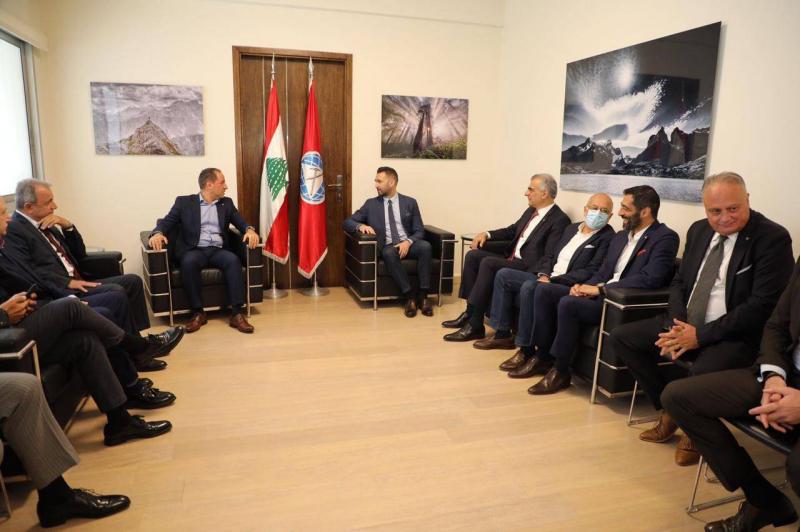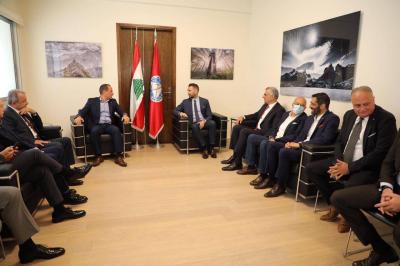The head of the "Lebanese Forces" party, MP Samy Gemayel, expressed his full readiness to coordinate and work together permanently after meeting with the head of the "Progressive Socialist Party," MP Timour Jumblatt. This collaboration aims to preserve Lebanon's sovereignty, economy, society, education, and health, and to achieve a better life while restoring the dignity and freedom of the Lebanese people and the state's decision-making sovereignty over all Lebanese territories. Gemayel stated that "the visit was in the context of congratulating MP Timour Jumblatt and the political council of the Progressive Socialist Party after the general conference," wishing them success in the new aspirations that any new era typically carries.
For his part, MP Hadi Abu al-Hassan welcomed the head of the Lebanese Forces and his accompanying delegation, thanking them for the visit and noting that it was an opportunity to review the Lebanese situation and the reality of the mountain region. He recalled the historic major reconciliation embodied by Patriarch Mar Nasrallah Boutros Sfeir and national leader Walid Jumblatt, which was preceded in 2000 by the famous meeting between former MP Walid Jumblatt and President Amin Gemayel and the esteemed family. He added: "Today, we are on the verge of receiving Maronite Patriarch Beshara Rai next Friday to affirm this important national historical course under the motto 'If the mountain is well, then Lebanon is well.' For Lebanon to be well, it is essential to reaffirm national constants and reconciliation constants, and the importance of breaking the wall of the Lebanese crisis that hinders the election of a president for the republic. While we appreciate our friends in Lebanon, the primary and significant responsibility remains with us as Lebanese political forces."
Abu al-Hassan hoped, along with "brothers in the Lebanese Forces party and all concerned parties in the country, to achieve this breakthrough, and we will continue this distinguished meeting with a series of other meetings for mutual coordination, whether at the level of the party or the two blocs in the parliamentary council."
### Opposition Delegation
MP Jumblatt also received a delegation from the opposition MPs, which included Ghassan Hasbani, Mark Daou, Adib Abd al-Masih, George Akeel, Elias Hankach, and Wadah al-Sadiq, in the presence of MPs Wael Abu Faour, Akram Shehayyab, Bilal Abdullah, Marwan Hamada, Hadi Abu al-Hassan, Faisal al-Sayegh, General Secretary Dhafer Nasser, and Jumblatt's advisor Hossam Harb. After the meeting, Hasbani stated: "As part of the rounds being conducted by the opposition forces, we came today and held this very fruitful dialogue, a dialogue about all dialogues and the current stage." He noted that "there are some points that require clarification in the approach, but we sensed essential points and basic constants that we are all in agreement on and approach in what may be somewhat different ways, but the goals are similar."
He continued: "It is imperative to continue this open discussion and the dialogues taking place among political forces that can communicate openly with each other, in order to break the existing stalemate in the political, social, and economic situation in Lebanon, starting from a comprehensive and constructive approach to electing a president for the republic within constitutional constants, in addition to reaching agreement on many steps aimed at saving the country and getting us out of a closed loop. Communication will continue between the opposition forces, the Progressive Socialist Party, and the friendly blocs in the parliamentary council that interact with one another in order to reach the desired solutions and break the stalemate, thus there will be steps following this visit."
### Hamada's Remarks
For his part, MP Marwan Hamada indicated that "the session held was an exceptional dialogue session centered around dialogue itself, but all discussions about dialogue aim to reach the election of a president for the republic as an entry point to exit the stifling crisis that has overshadowed the government, institutions, and everything happening and not happening in the country." Therefore, we discussed legislative matters, potential presidential candidates, the nature of the dialogue, and the necessity of continuing communication with President Nabih Berri so that the nature of this dialogue and the mechanisms that the Speaker will adopt become clear to all of us, affirming the need to take necessary steps."
He added: "Through this session, we show that there are many intersections that remain valid and ongoing among us, and there are points that require clarification and further consultation."




